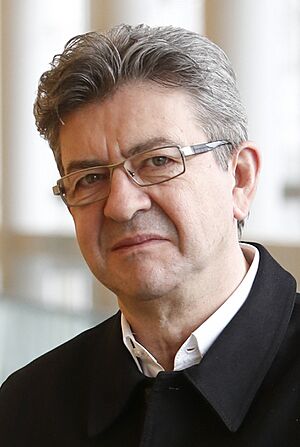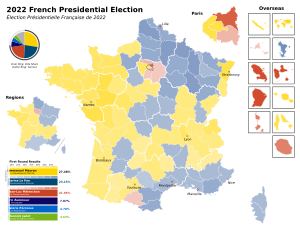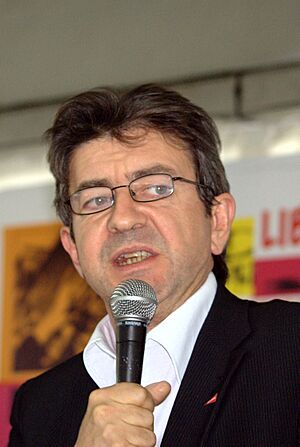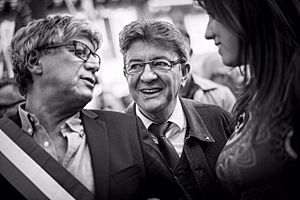Jean-Luc Mélenchon facts for kids
Quick facts for kids
Jean-Luc Mélenchon
|
|
|---|---|

Mélenchon in 2016
|
|
| President of the La France Insoumise group in the National Assembly | |
| In office 27 June 2017 – 12 October 2021 |
|
| Preceded by | Position established |
| Succeeded by | Mathilde Panot |
| Member of the National Assembly for Bouches-du-Rhône's 4th constituency |
|
| In office 21 June 2017 – 21 June 2022 |
|
| Preceded by | Patrick Mennucci |
| Succeeded by | Manuel Bompard |
| Member of the European Parliament | |
| In office 14 July 2009 – 18 June 2017 |
|
| Constituency | South-West France |
| Minister Delegate for Vocational Education | |
| In office 27 March 2000 – 6 May 2002 |
|
| Prime Minister | Lionel Jospin |
| Preceded by | Claude Allègre |
| Succeeded by | Luc Ferry |
| Senator for Essonne | |
| In office 1 October 2004 – 7 January 2010 |
|
| In office 2 October 1986 – 27 April 2000 |
|
| Personal details | |
| Born |
Jean-Luc Antoine Pierre Mélenchon
19 August 1951 Tangier, Tangier International Zone (current-day Morocco) |
| Political party | La France Insoumise (since 2016) |
| Other political affiliations |
|
| Alma mater | University of Franche-Comté |
| Website | |
Jean-Luc Mélenchon (born 19 August 1951) is a famous French politician. He is best known as the leader of the political party La France Insoumise (LFI), which means "Unbowed France." He started the party in 2016.
Mélenchon has been a major figure in French politics for many years. He was a member of the National Assembly, which is like the French parliament, from 2017 to 2022. He also served as a Member of the European Parliament (MEP) from 2009 to 2017.
He has run for President of France three times: in 2012, 2017, and 2022. In the 2022 election, he came very close to making it to the final round of voting, finishing in third place. He then helped create a group of left-wing parties called the New Ecological and Social People's Union (NUPES) and later the New Popular Front (NFP).
Early Life and Career
Growing Up and Education
Jean-Luc Mélenchon was born in Tangier, Morocco. His father was a postmaster and his mother was a school teacher. His family was of Spanish and Sicilian heritage. In 1962, when he was a boy, his family moved to France.
He went to school in Rouen, a city in Normandy. He later studied philosophy at the University of Franche-Comté. After graduating, he became a teacher before he started his career in politics.
Joining the Socialist Party
In 1976, Mélenchon joined the Socialist Party. He quickly became involved in local politics. He was elected as a town councillor in Massy in 1983. In 1986, he was elected to the Senate, the upper house of the French parliament. At 35, he was the youngest senator at the time.
From 2000 to 2002, he served as the Minister for Vocational Education. This role involved overseeing job training and skills education for the country.
A New Political Path
Leaving the Socialists
Mélenchon was part of the left-wing of the Socialist Party. Over time, he felt the party was moving away from its core values. In 2008, he and another politician, Marc Dolez, decided to leave the Socialist Party.
They wanted to create a new movement that was more focused on their left-wing ideas. They founded the Left Party and called for other left-wing groups to join them. This led to the creation of an alliance called the Left Front for the 2009 European elections.
First Run for President in 2012
Mélenchon was the Left Front's candidate for president in the 2012 French presidential election. He surprised many people by finishing in fourth place with 11.1% of the vote. This was a strong result for a candidate from outside the main parties.
After the presidential election, he ran for a seat in the National Assembly. He ran in the same district as Marine Le Pen, another major political figure. He came in third and did not win the seat.
La France Insoumise and Recent Elections
Second Presidential Campaign in 2017
In 2016, Mélenchon started a new political movement called La France Insoumise (LFI). He wanted to create a platform that was open to everyone, not just members of a specific party.
He ran for president again in the 2017 French presidential election. His campaign gained a lot of energy, especially after strong performances in televised debates. He finished in fourth place again, but this time with 19.6% of the vote, which was over 7 million votes.
Member of the National Assembly
In the 2017 French legislative election, Mélenchon was elected to the National Assembly. He represented a district in Marseille, France's second-largest city. He won with nearly 60% of the vote in the final round.
In the Assembly, he became a leading voice of opposition to President Emmanuel Macron's government. He was known for his passionate speeches and for defending workers' rights.
Third Presidential Campaign in 2022

Mélenchon ran for president a third time in the 2022 French presidential election. His support grew in the final weeks of the campaign. He finished in third place with nearly 22% of the vote, just over one percentage point away from reaching the second round.
He was very popular with young voters and in France's overseas territories. After the election, he did not run for his seat in the National Assembly again. Instead, he focused on building a larger left-wing alliance.
This led to the creation of the New Ecological and Social People's Union (NUPES). This alliance brought together LFI, the Socialists, the Greens, and the Communists. NUPES became the main opposition group in the National Assembly after the 2022 French legislative election.
What Does Mélenchon Believe?
Mélenchon is a socialist and a republican. He is inspired by Jean Jaurès, a famous French socialist leader from the early 20th century. He is a strong critic of neoliberalism, an economic theory that favors free markets and less government spending.
A New Republic
One of Mélenchon's biggest ideas is to create a "Sixth Republic" for France. He wants to write a new constitution to give more power to the people and the parliament, and less power to the president. He believes this would make France more democratic.
Economy and Society
Mélenchon supports policies that help workers and reduce inequality. Some of his ideas include:
- Increasing the minimum wage and other social benefits.
- Making the state pay for all healthcare costs.
- Putting a 100% tax on incomes over a certain very high amount.
- Protecting the environment with green policies.
- Supporting same-sex marriage and a woman's right to choose.
He also believes in "créolisation," an idea from the poet Édouard Glissant. This means that cultures should mix together to create something new and shared by everyone.
Foreign Policy
Mélenchon is a critic of the European Union (EU) in its current form. He believes it has become too focused on free-market policies. He wants to renegotiate the treaties that govern the EU to make them fairer for ordinary people.
He also opposes the North Atlantic Treaty Organization (NATO), a military alliance. He has called for France to leave NATO to have more independence in its foreign policy.
Political Career Offices
- Governmental functions
- Minister of Vocational Education, 2000–2002
- Electoral mandates
- National Assembly
- Member for Bouches-du-Rhône's 4th constituency, 2017–2022
- European Parliament
- Member of the European Parliament, 2009–2017
- Senate
- Senator of Essonne, 1986–2000, 2004–2010
- General Council
- Vice-president of the General Council of Essonne, 1998–2001
- General councillor of Essonne, 1985–1992, 1998–2004
- Municipal Council
- Deputy-mayor of Massy, Essonne, 1983–1995
- Municipal councillor of Massy, Essonne, 1983–2001
- Political function
- Co-president of the Left Party, 2008–2014
Images for kids
-
Mélenchon (right) with Olivier Besancenot (left) and José Bové (centre) at a meeting to support the "No" vote in the 2005 French European Constitution referendum
See also
 In Spanish: Jean-Luc Mélenchon para niños
In Spanish: Jean-Luc Mélenchon para niños
 | Dorothy Vaughan |
 | Charles Henry Turner |
 | Hildrus Poindexter |
 | Henry Cecil McBay |




